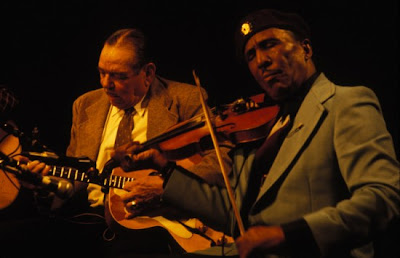Louie Bluie
 Mr. Howard "Louie Bluie" Armstrong sits in an apartment, rambling on about the old days the way folks up in years often do. There are other men there, including a gent who scarfs down Kentucky Fried Chicken and barely pays attention. Armstrong tells many tales, many of them tall and suspicious. After a while, even the storyteller can't remember what's true and what's hooey. All this talk about his wooing and bedding the ladies, and of all ages, to boot. Colorful anecdotes all. Much of it, probably bullshit. But honestly, does it even matter? Unless you're taking a deposition, you shouldn't be concerned with such things. Not a bit, especially when your subject is as ingratiating and entertaining as Armstrong.
Mr. Howard "Louie Bluie" Armstrong sits in an apartment, rambling on about the old days the way folks up in years often do. There are other men there, including a gent who scarfs down Kentucky Fried Chicken and barely pays attention. Armstrong tells many tales, many of them tall and suspicious. After a while, even the storyteller can't remember what's true and what's hooey. All this talk about his wooing and bedding the ladies, and of all ages, to boot. Colorful anecdotes all. Much of it, probably bullshit. But honestly, does it even matter? Unless you're taking a deposition, you shouldn't be concerned with such things. Not a bit, especially when your subject is as ingratiating and entertaining as Armstrong.Howard is also an energetic fiddler and mandolonist who'd played a wide variety of styles (including blues, country, and ragtime) since the 1920s. Director Terry Zigoff's 1985 documentary LOUIE BLUIE is a pleasing hour with Armstrong and his sidemen, with no particular goal other than some time well spent with colorful folks. The film breaks away a few times with stills and voiceover, narrators explaining the cultural climates in the 30s, the medicine shows in which they played. There's a hometown visit to Tennessee. We hear lots of recollections.
But Zwigoff wisely does not try to recreate the stories with actors, as simply hearing Howard, rhythm guitarist Ted Bogan, and others reminisce paints far more vivid pictures. A tale of how Armstrong's band once walked into an Italian club and turned around a dangerous scenario is a great example. Peppering the anecdotes are lines like "you could suck the juice offa grape".
Armstrong's speech is quite suggestive, even when he isn't being blatantly ribald. It's who he is. At one point he pulls out his provocative book of artwork called "Pornography", with illustrations curiously similiar to those of underground cartoonist R. Crumb, who was featured in his own doc, CRUMB, by Zwigoff some years later. The book's panels detail a history of intercourse, with a folksy, earthy point of view. Almost Bakshi-like, too (I wonder if Armstrong ever saw COONSKIN). Armstrong's talent is obvious, and that Zwigoff included this in the movie is as much a statement to the director's sensibilities as it is a further elucidation of the gumbo that is this man. And Armstrong's quite outspoken about his art appreciation; one scene shows him deriding the famous Picasso structure in Chicago!
And also, music, naturally. When a fan asks him if he plays any B.B. King, he replies, "if you put some strings on him, I'll play him."
LOUIE BLUIE reminded me of a another little seen documentary, Errol Morris' VERNON, FLORIDA. If you want to see a true piece of Americana, you owe yourself that experience. There's no varnishing the behavior of its residents. We may laugh at their lack of sophistication, but are also in quiet awe of their honesty. That's how I felt with Armstrong and his cronies. Guys talking as if no one's watching or listening. But they wouldn't care anyway. They are who they are. The talk gets mighty salty, especially on the subject of the fairer gender, but it's realistic.
If I have a complaint, it would be that LOUIE BLUIE is too short. Maybe more music should've been included. The Criterion disc has some funny deleted scenes. Love that final long shot of Maxwell Street in Chicago.


Comments